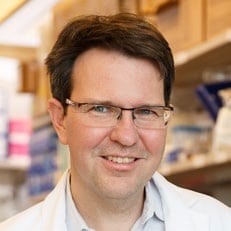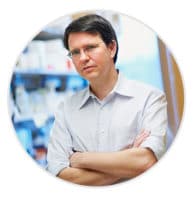Researcher Spotlight: Hans-Guido Wendel, MD
Memorial Sloan Kettering Cancer Center
Translational research transforms scientific discoveries that occur in the laboratory into new treatments for lymphoma and other types of cancer. This important step in the search for new therapies for lymphoma is a priority for Dr. Hans-Guido Wendel, a Lymphoma Research Foundation (LRF) grantee and Associate Member of the Sloan-Kettering Cancer Center’s Cancer Biology and Genetics Department.
Dr. Wendel and his collaborators are focusing their efforts on follicular lymphoma (FL), specifically a surface receptor protein called EPHA7. In normal B-cells in the human immune system, EPHA7 helps control the growth of neighboring B-cells. In laboratory research, Dr. Wendel and his team determined that EPHA7 was inactivated in lymphoma B-cells, allowing the cancer cells to grow uncontrollably. The researchers hypothesized that if they could reintroduce EPHA7 to those lymphoma cells it would help stop the progression of the disease. “The ‘trick’ we used was to tag EPHA7 on to an antibody that recognizes B-lymphoma cells,” Dr. Wendel explains. “In this manner the protein is delivered to the lymphomas and can restore growth control.” To continue the development of this novel treatment, LRF awarded Dr. Wendel with a three-year Follicular Lymphoma Pathways Grant.
Dr. Wendel’s LRF-funded research is currently focused on FL, a subtype where roughly 70 percent of tumors show EPHA7 inactivation, making a therapy targeted at reactivated the protein potentially effective for a majority of patients. Additional research by Dr. Wendel’s team found EPHA7 inactivation is even more common in aggressive diffuse large B-cell and Burkitt’s lymphomas, suggesting a potential use for this therapy across several more subtypes of lymphoma. Dr. Wendel notes that translating this discovery to the clinic, though “clearly an important phase of the research,” is the type of research not well funded at the federal level. “Therefore, LRF funding is absolutely essential to push new ideas like this from the lab towards the clinic.” Moreover, Dr. Wendel adds, LRF funding has allowed him to recruit new scientists to study the genetics of lymphoma and potential new therapies by providing the resources to hire them in his lab.
Dr. Wendel’s background and training have prepared him for this important work: he completed his medical residency at the Medical School of the Technical University of Aachen in his native Germany, before completing fellowships at Memorial Sloan-Kettering and Cold Spring Harbor Laboratory. While training in Germany, where many of his patients had been diagnosed with lymphoma, he says he was “struck by the limited options – essentially only chemotherapy – I had for these patients. On the other hand, we were beginning to learn much about the causes of lymphoma. I felt there was an exciting opportunity to develop new cancer therapies – and that is what we are doing now.”
Dr. Wendel advises patients recently diagnosed with lymphoma to seek an opinion from a cancer center that is also actively engaged in research, as “this will ensure you have considered all the therapeutic options.” He notes some of the “major breakthroughs” in the field since the beginning of his career are dramatically changing the treatment options for lymphoma, including rituximab (the antibody Dr. Wendel’s team uses to deliver EPHA7), new kinase inhibitors, immunotherapies, and engineered T-cells. “From the days of chemo-only we can now envision the chemo-free therapy of lymphoma.”


